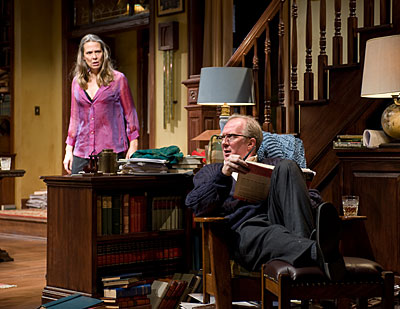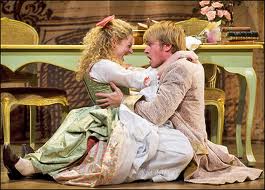“Hope is the best possession. None are completely wretched but those who are without hope; and few are reduced so low as that.”
William Hazlitt, Characteristics
Archives for 2010
TT: Winging our way
 By the time most of you get around to reading this posting, Mrs. T and I will be on our way to Chicago, where we’re spending the next two days hanging out with Our Girl (whom we love dearly) and seeing Steppenwolf Theatre Company’s much-discussed revival of Who’s Afraid of Virginia Woolf? (which stars Tracy Letts, the author of Killer Joe and August: Osage County, who is also a highly distinguished actor in his own right). On Wednesday we head down to Smalltown, U.S.A., where Christmas and my family are to be found.
By the time most of you get around to reading this posting, Mrs. T and I will be on our way to Chicago, where we’re spending the next two days hanging out with Our Girl (whom we love dearly) and seeing Steppenwolf Theatre Company’s much-discussed revival of Who’s Afraid of Virginia Woolf? (which stars Tracy Letts, the author of Killer Joe and August: Osage County, who is also a highly distinguished actor in his own right). On Wednesday we head down to Smalltown, U.S.A., where Christmas and my family are to be found.
I’ll do my best to keep you posted on what we’re up to this week, but if I don’t, there’ll still be the usual videos, almanac entries and theater-related postings to keep you occupied.
In the meantime, enjoy the holidays–we will!
TT: ‘Tis the season (I)
Mel Tormé and Judy Garland sing Tormé’s “The Christmas Song” on The Judy Garland Christmas Show, originally aired on CBS in 1963:
TT: Almanac
“Christmas is a holiday that persecutes the lonely, the frayed and the rejected.”
Jimmy Cannon, Nobody Asked Me, But…
TT: Stuffing the stockings
National Review Online recently asked me to make some Christmas-gift suggestions. To see my picks, go here and scroll down.
TT: Taking another shot at Candide
In today’s Wall Street Journal drama column, I report on Mary Zimmerman’s new production of Candide–not very enthusiastically, I fear. Here’s an excerpt.
* * *
Of all the great musicals, “Candide” poses the biggest problems to anyone who tries to stage it. It’s universally agreed that Leonard Bernstein’s brilliant operetta-style score is altogether worthy of Voltaire’s ferocious satire of 18th-century optimism, but the original 1956 Broadway production closed after 73 performances, mainly because of the heavy-handedness of Lillian Hellman’s book, and since then the show has been revised and rewritten repeatedly in an attempt to make it work. Now Mary Zimmerman, whose “Metamorphoses” hit big in 2002, has taken up the challenge, concocting a new version of “Candide” co-produced by Chicago’s Goodman Theatre and the Shakespeare Theatre Company of Washington, D.C., where I saw it last week. I wish I could say that Ms. Zimmerman has finally cracked the “Candide” code, but her version, despite many memorable moments, fails once again to solve the problem of creating a convincing context for Bernstein’s miraculously effervescent music.
 Ms. Zimmerman, like the vast majority of her predecessors, takes as a starting point Harold Prince’s successful 1974 Broadway revival of “Candide,” for which Hugh Wheeler wrote an all-new book that was undeniably effective but dismayingly vulgar. Eight years later Mr. Prince put together a longer “opera-house version” of the show for the New York City Opera, and in 1989 Bernstein himself recorded an even longer “final revised version” of the score with which subsequent directors have continued to tinker. This time around, Ms. Zimmerman has scrapped Wheeler’s dialogue, replacing much of it with speeches drawn directly from Voltaire’s novella, and has crammed in more of Bernstein’s revised score than any previous non-operatic stage version.
Ms. Zimmerman, like the vast majority of her predecessors, takes as a starting point Harold Prince’s successful 1974 Broadway revival of “Candide,” for which Hugh Wheeler wrote an all-new book that was undeniably effective but dismayingly vulgar. Eight years later Mr. Prince put together a longer “opera-house version” of the show for the New York City Opera, and in 1989 Bernstein himself recorded an even longer “final revised version” of the score with which subsequent directors have continued to tinker. This time around, Ms. Zimmerman has scrapped Wheeler’s dialogue, replacing much of it with speeches drawn directly from Voltaire’s novella, and has crammed in more of Bernstein’s revised score than any previous non-operatic stage version.
The result is a musical that runs for three hours and feels slow, especially in the second act, which sags badly in the middle. It doesn’t help that Ms. Zimmerman, like Wheeler before her, relies on a string of third-person narrators to advance the episodic plot, a device that slows the action to something in between a crawl and a waddle. The hectic staging–the actors are forever pushing around props and set pieces–fails to paper over the sluggish pacing…
* * *
Read the whole thing here.
TT: Almanac
“Only two classes of books are of universal appeal: the very best and the very worst.”
Ford Madox Ford, Joseph Conrad : A Personal Remembrance
DANCE
Les Ballets Trockadero de Monte Carlo (Joyce, 175 Eighth Ave., closes Jan. 2). The Trocks are an all-male ballet company whose “women” dance in drag. Sometimes they do the classics more or less straight, sometimes they dance brilliantly witty parodies, and sometimes they do out-of-left-field works like Merce Cunningham’s Patterns in Space, which is on the first of the two programs that they’re dancing during their current New York season. No matter what they’re doing, the results are at once uproariously funny and mysteriously illuminating. To spend an evening with the Trocks is to think twice–or more–about what ballet is and how it works. Very strongly recommended, even to those who (like me) are usually allergic to drag acts (TT).
